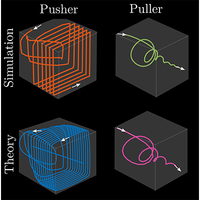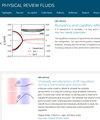Confinement induced three-dimensional trajectories of microswimmers in rectangular channels
IF 2.5
3区 物理与天体物理
Q2 PHYSICS, FLUIDS & PLASMAS
引用次数: 0
Abstract
We study the trajectories of a model microorganism inside three-dimensional channels with square and rectangular cross sections. Using (1) numerical simulations based on the lattice-Boltzmann method and (2) analytical expressions using far-field hydrodynamic approximations and the method of images we systematically investigate the role of the strength and finite-size of the squirmer, confinement dimensions, and initial conditions in determining the three-dimensional trajectories of microswimmers. Our results indicate that the hydrodynamic interactions with the confining walls of the channel significantly affect the swimming speed and trajectory of the model microswimmer. Specifically, pullers always display sliding motion inside the channel: weak pullers slide through the channel center line, while strong pullers slide through a path close to any of the walls. Pushers generally follow helical motion in a square channel. Unlike pullers and pushers, the trajectories of neutral swimmers are not easy to generalize and are sensitive to the initial conditions. Despite this diversity in the trajectories, the far-field expressions capture the essential features of channel-confined swimmers. Finally, we propose a method based on the principle of superposition to understand the origin of the three-dimensional trajectories of channel confined swimmers. Such construction allows us to predict and justify the origin of apparently complex three-dimensional trajectories generated by different types of swimmers in channels with square and rectangular cross sections.

矩形水道中微游子的密闭诱导三维轨迹
我们研究了模型微生物在具有正方形和矩形横截面的三维通道内的运动轨迹。我们使用(1)基于格子-玻尔兹曼法的数值模拟和(2)使用远场流体力学近似和图像法的分析表达式,系统地研究了微游子的强度和有限尺寸、封闭尺寸和初始条件在决定微游子的三维轨迹中的作用。我们的研究结果表明,与通道约束壁之间的流体动力学相互作用对模型微游泳者的游泳速度和轨迹有显著影响。具体来说,牵引者总是在水道内做滑动运动:弱牵引者通过水道中心线滑动,而强牵引者通过靠近任何水道壁的路径滑动。推杆通常在方形通道内做螺旋运动。与拉力器和推力器不同,中性游泳者的运动轨迹不易概括,而且对初始条件很敏感。尽管运动轨迹多种多样,但远场表达式还是捕捉到了通道封闭游泳者的基本特征。最后,我们提出了一种基于叠加原理的方法来理解通道封闭泳道三维轨迹的起源。这种构造使我们能够预测不同类型的游泳者在方形和矩形横截面的水道中产生的表面上复杂的三维轨迹的起源,并证明其合理性。
本文章由计算机程序翻译,如有差异,请以英文原文为准。
求助全文
约1分钟内获得全文
求助全文
来源期刊

Physical Review Fluids
Chemical Engineering-Fluid Flow and Transfer Processes
CiteScore
5.10
自引率
11.10%
发文量
488
期刊介绍:
Physical Review Fluids is APS’s newest online-only journal dedicated to publishing innovative research that will significantly advance the fundamental understanding of fluid dynamics. Physical Review Fluids expands the scope of the APS journals to include additional areas of fluid dynamics research, complements the existing Physical Review collection, and maintains the same quality and reputation that authors and subscribers expect from APS. The journal is published with the endorsement of the APS Division of Fluid Dynamics.
 求助内容:
求助内容: 应助结果提醒方式:
应助结果提醒方式:


